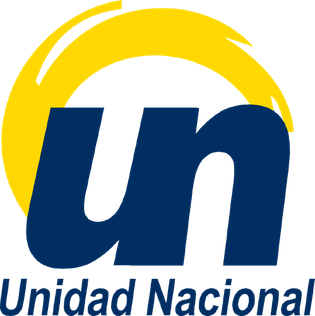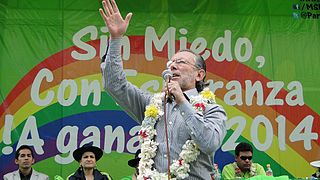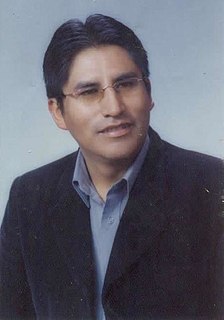
The politics of Bolivia takes place in a framework of a presidential representative democratic republic, whereby the president is head of state, head of government and head of a diverse multi-party system. Executive power is exercised by the government. Legislative power is vested in both the government and the two chambers of parliament. Both the Judiciary and the electoral branch are independent of the executive and the legislature. After the 2014 election, 53.1% of the seats in national parliament were held by women, a higher proportion of women than that of the population.

The Plurinational Legislative Assembly is the national legislature of Bolivia, placed in La Paz, the country's seat of government.

The Movement for Socialism–Political Instrument for the Sovereignty of the Peoples, alternately referred to as the Movement Toward Socialism or the Movement to Socialism, is a Bolivian left-wing populist and indigenist political party led by Evo Morales, founded in 1998. Its followers are known as Masistas.

The National Unity Front is a political party in Bolivia. It was founded in late 2003 by Samuel Jorge Doria Medina Auza, who had broken with the Revolutionary Left Movement earlier that year. It has 36 members of the Chamber of Deputies in the Plurinational Legislative Assembly. Despite its substantial share of the urban vote, and 16 former mayors, it does not control any city halls or governorships. The party is closely identified with Doria Medina's cement company Sociedad Boliviana de Cemento (Soboce).

General elections were held in Bolivia on December 6, 2009, following a constitutional referendum held on 25 January 2009. Voters elected:

Juan Fernando del Granado Cosío is a Bolivian human-rights lawyer and politician, mayor of La Paz (2000–2010) and founder of the Movement without Fear, a progressive political party. On November 11, 2013, he officially announced his candidacy for president of Bolivia for the 2014 election.

The 2010 Bolivian regional elections were held on 4 April 2010. Departmental and municipal authorities were elected by an electorate of approximately 5 million people. Among the officials elected are:
The Movement for Sovereignty is a leftist, indigenist Bolivian political party founded by dissidents of the Movement for Socialism (MAS-IPSP). Its leader, and fourth-place candidate for Governor of La Paz department in the 2010 regional election is Lino Villca. Other MAS-IPSP activists involved in founding the MPS include Óscar Chirinos, Miguel Machaca, and Rufo Calle. The party's colors are blue, white, and yellow.

Municipal elections were held in Bolivia, on December 5, 1999, in all 311 municipalities across the country. The elections marked a milestone in the continuous deterioration of the political influence of the traditional parties. In 23 municipalities the mayors were elected through direct popular vote, in other municipalities the mayors were elected by the respective municipal council.
The first Bolivian judicial election was held on 16 October 2011. The national vote was held to elect magistrates to serve on the Supreme Court of Justice, the Plurinational Constitutional Court, the Agro-environmental Court and members of the Judiciary Council. It was originally scheduled to be held on 5 December 2010, but officials of the National Electoral Court and of the MAS majority in the Plurinational Legislative Assembly delayed it. The vote will be the first time that a Latin American country directly elects its highest judicial officials.
The Assembly for the Sovereignty of the Peoples was a political organization in Bolivia. It was formed as a "political instrument" of the popular movements of the country. Alejo Véliz was the national president of ASP.

The United Left was a political coalition in Bolivia. IU was launched ahead of the 1989 national elections, as a successor of the United People's Front (FPU). At the time of its founding IU consisted of eight parties, including the Revolutionary Left Movement - Free Bolivia (MIR-BL), the Communist Party of Bolivia (PCB), the Socialist Party-1 (PS-1), the Axis of Patriotic Convergence (ECP), the Movement for Socialist-Unzaguist (MAS-U) and FOM.

Félix Patzi Paco is a Bolivian academic and politician. Since May 31, 2015, he is the governor of the La Paz Department. A member of the Aymara ethnic group, he has been active in supporting indigenous movements in Bolivia.

Edmundo Novillo Aguilar is a Bolivian lawyer, politician, and Governor of Cochabamba. His political career includes serving on the Departmental Council, as Mayor of Totora, and as a Deputy in the Bolivian Chamber of Deputies. He was Presidents of the Chamber of Deputies for four years from 2006 to 2010. He is affiliated with the Movement for Socialism (MAS-IPSP), and was the first MAS-IPSP member to serve a President of the Chamber of Deputies.
The 2011 Bolivian special municipal elections were held on 18 December 2011. These elections cover three of five municipalities currently without elected mayors in Bolivia: Sucre, Quillacollo, and Pazña. Elections for the Mayor of Punata will be held 29 April or 6 May 2012. Newly elected mayors will receive their credentials from the Supreme Electoral Tribunal on 27 January 2011, after which they may be sworn in.

General elections were held in Bolivia on 12 October 2014, the second to take place under the country's 2009 constitution, and the first supervised by the Plurinational Electoral Organ, a newly created fourth branch of government. Incumbent President Evo Morales was re-elected for a third term.

The 2010–2015 Plurinational Legislative Assembly of Bolivia was the first class of the Bolivian legislature, also known as the Plurinational Legislative Assembly, to go by that name. The Assembly was controlled in both houses by the governing Movement for Socialism (MAS-IPSP), elected with a 2/3 supermajority, although some members later separated themselves from the majority. Just four incumbent members of the 2005–2010 Congress returned: Deputy Antonio Franco; Deputy Javier Zabaleta (MAS-IPSP/MSM); Senator René Martínez (MAS-IPSP), who was a deputy; and Senator Róger Pinto, previously of Podemos and now representing PPB-CN.

Wilma Alanoca Mamani is a Bolivian journalist and politician who served as the Minister of Cultures of Bolivia from 2017 to 2019 during the third government of President Evo Morales. She previously served as opposition councilor of the municipality of El Alto from 2015 to 2017 for the Movement for Socialism (MAS-IPSP), during the administration of mayor Soledad Chapetón.

Mónica Eva Copa Murga is a Bolivian social worker and politician currently serving as the Mayor of El Alto. She previously served as a Bolivian senator for La Paz between 2015 and 2020, as well as the President of the Senate from 2019 to 2020. She is a former member of the political party Movement for Socialism.

The 2021 Bolivian regional elections were held on 7 March 2021. Departmental and municipal authorities were elected by an electorate of approximately 7 million people. This was the third regional election under the 2009 constitution. It was postponed from the expected date of 2020 due to the 2019 Bolivian political crisis and delays in holding the 2020 Bolivian general election. All elected authorities assumed office on 3 May.















